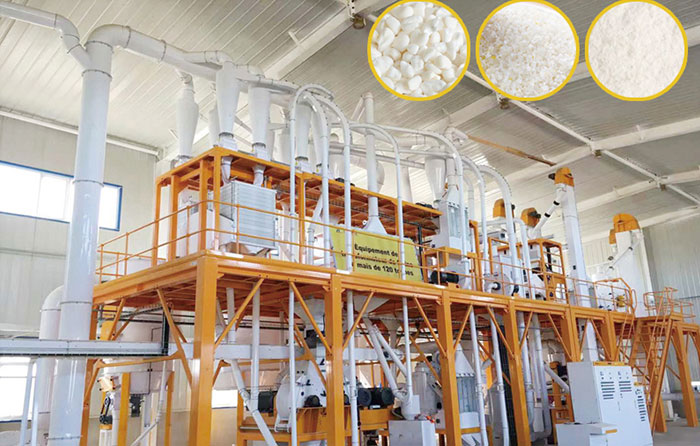Maize flour milling plant play a crucial role in food production, as maize flour serves as a staple food for millions of people worldwide. The milling process involves the conversion of maize kernels into finely ground maize flour through a series of meticulously designed stages. Understanding this process is essential for millers, food processors, and anyone interested in the world of food production.

1. Cleaning and Conditioning: Laying the Foundation
The journey of maize flour production begins with the cleaning and conditioning stage. During this initial phase, maize kernels undergo thorough cleaning to remove any impurities, such as stones, sticks, dust, and other foreign materials. This critical step ensures that only the highest quality maize enters the milling process, resulting in premium-grade flour.
After cleaning, the maize kernels undergo conditioning, where moisture is added to achieve the desired moisture content. Proper conditioning is essential for optimal milling efficiency and higher flour extraction rates.
2. Degermination: Enhancing Shelf Life
Once the maize kernels are cleaned and conditioned, they are directed to the degerminator. Degermination is a pivotal step in the milling process, as it involves the removal of the germ (embryo) from the maize kernel. By eliminating the germ, the shelf life of the flour is extended, reducing its susceptibility to spoilage and enhancing its overall stability.
3. Milling: The Heart of the Process
The milling process is the heart of the maize flour milling plant, where the maize kernels undergo transformation into fine flour. Several milling methods are employed in the industry, each offering unique advantages. The primary milling methods include:
- Roller Milling:
This method utilizes a series of rollers to crush the maize kernels, effectively separating the endosperm from the bran and germ. The resulting endosperm is then ground into the desired fine flour.
- Hammer Milling:
Hammer milling involves the use of hammers to pulverize the maize kernels into particles. The particles are then sifted to obtain the desired flour size.
- Plate Milling:
Plate mills use a set of grinding plates to crush the maize kernels, producing flour with the desired fineness.
4. Sifting and Classification: Refining the Flour
After the milling process, the flour undergoes sifting and classification to separate it from any remaining bran and germ particles. Sifters and classifiers are employed to obtain different grades of flour, catering to various culinary and industrial needs.
5. Fortification and Packaging: Adding Nutritional Value
In certain regions, maize flour is fortified with essential nutrients, such as iron and vitamins, to address nutritional deficiencies. Fortification enhances the flour's nutritional value, making it more beneficial for consumers. After fortification, the flour is carefully packaged into various-sized bags for distribution and sale.
Conclusion
Understanding the process flow of a maize flour milling machine is essential for all stakeholders in the food production industry. From cleaning and conditioning the maize kernels to the crucial milling process and final fortification and packaging, each stage contributes to the production of high-quality maize flour that meets the dietary needs of millions around the world.
Maize flour milling is a complex and fascinating process that requires expertise, precision, and dedication to achieve efficient production and deliver top-notch products to consumers. By comprehending the intricacies of the milling plant's process flow, millers can optimize their operations and contribute to the global supply of nutritious maize flour.



Comments
Please Join Us to post.
0